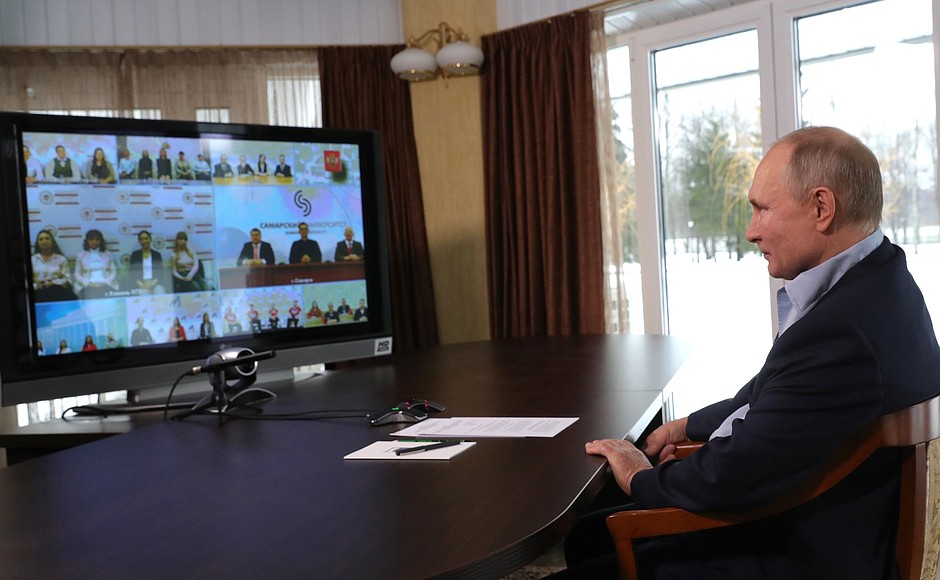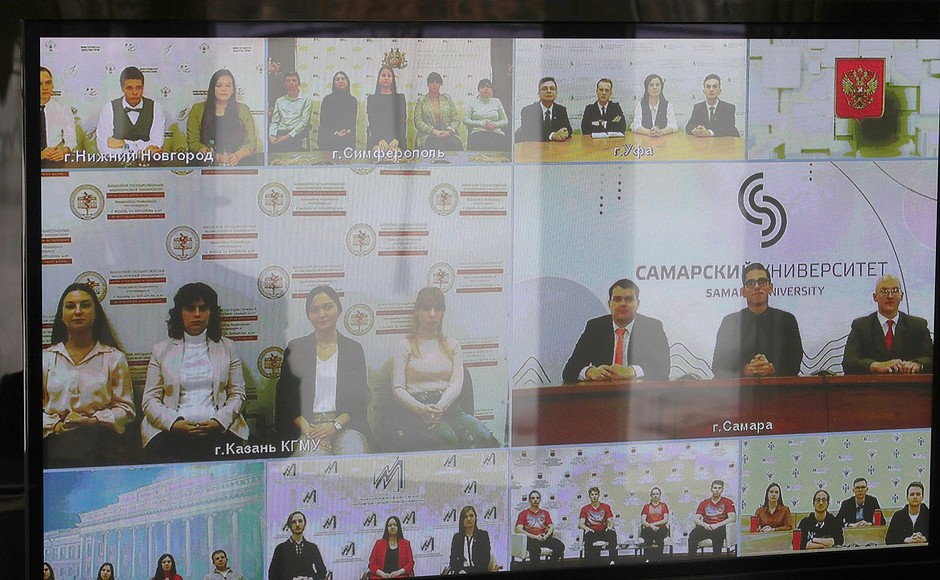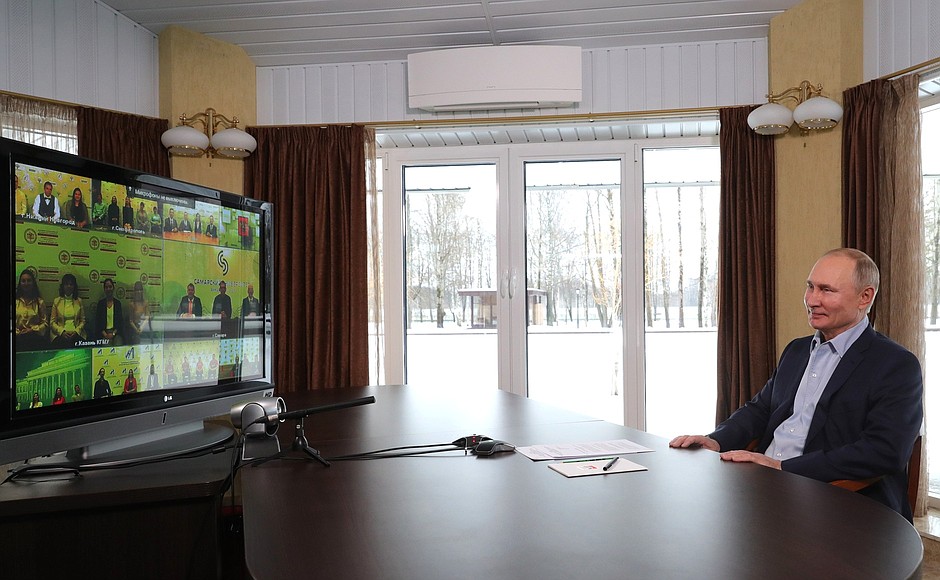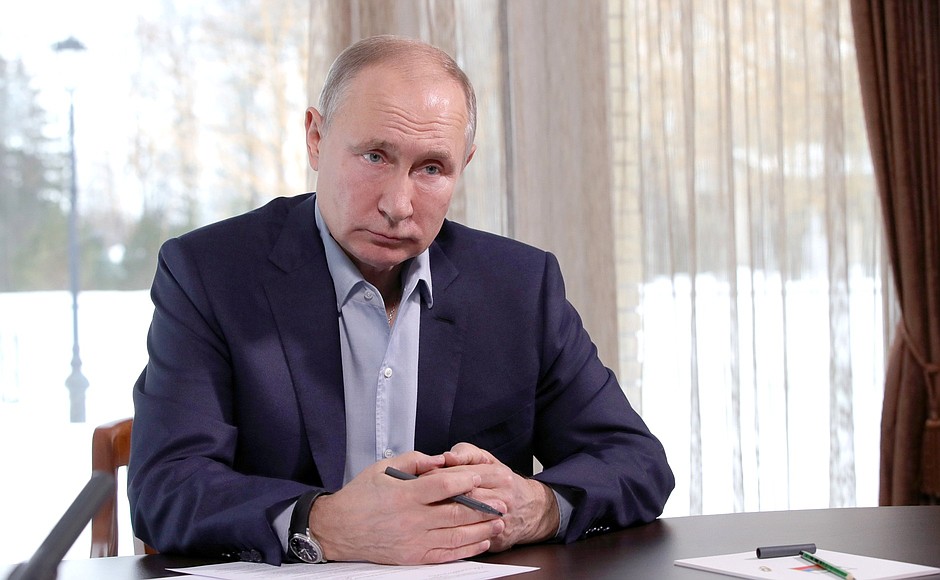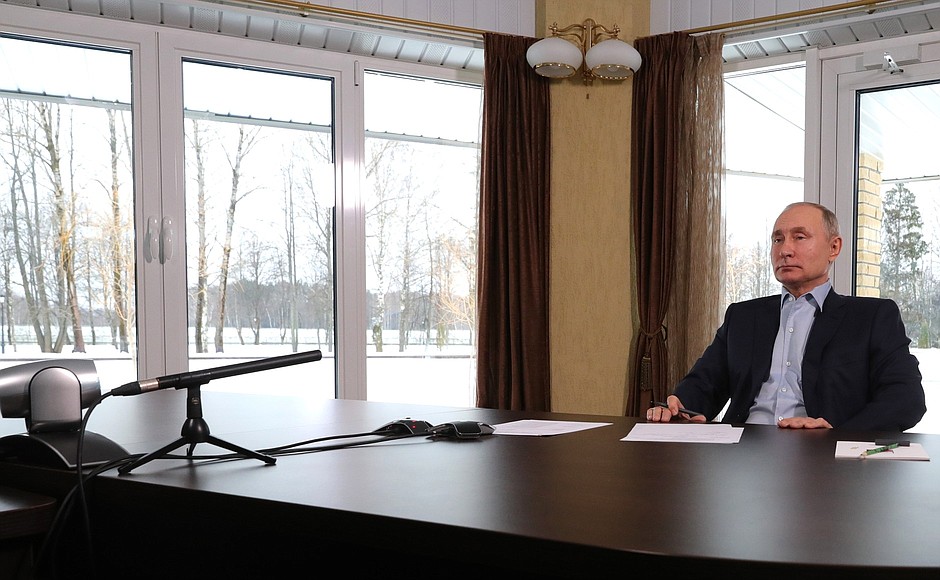Excerpts from Transcript of meeting with university students to mark Russian Students Day
President of Russia Vladimir Putin: Dear friends, good afternoon.
Can you hear and see me? It is a pleasure to you see you too.
Today, by an old and good tradition, we celebrate Tatiana’s Day. I heartily congratulate you all, graduate and postgraduate students of Russian universities, as well as graduates of previous years, on the holiday devoted to Russian students. I wish you all success in life, in your studies, in your jobs, and of course, something that is very important today, I wish you, your relatives, and friends good health, and love – you are young people, as well as loyal, good friends.
I would like to use this opportunity to thank you for your perseverance, stamina, and readiness to learn and receive new knowledge amid the difficult conditions of the pandemic.
Of course, it has been repeatedly said that in the past few difficult months you missed the thrilling, inimitable, fascinating student and university environment. I am sure that most of you have been missing personal communication with your friends and mentors.
But I want to emphasise that both you and your lecturers have worked as one team and you have done your best to continue holding lectures, seminars and exams, in a word, to continue the entire learning process, and together have dealt with the various issues that occurred during this time, as they tend to do.
I know that the technical capabilities for remote study are not always available, some places lack equipment and the necessary internet speed. We have all seen how people even had to climb trees to get internet access. There have also been objective difficulties with organising practical lessons. Overall, this unusual format could not but affect the comprehensiveness and quality of education and the academic performance rating. I am sure that you and your lecturers will definitely catch up with what has been missed, if there is a need for that.
Again, I reiterate that the transition to a totally remote study format was an exclusively temporary measure (in the places where it was introduced), related to, as we know, the spread of the coronavirus. As of now – as it is well known – we have got effective vaccines; they have been registered in 13 countries.
Overall, the epidemiological situation in the country is gradually stabilising. I have heard appropriate reports only this morning. The number of people who have recovered in the last 24 hours exceeds the number of new cases. There is a decrease in the number of people currently infected; it is less than 20,000 as of today.
By the way, we should thank the Moscow authorities for this; their efforts have not been in vain: the situation is normalising in Moscow. This allows them to carefully ease the restrictions and resume a normal education process.
At the same time, we must make use of the experience we have accumulated, the best know-how and practices, increasing the digital potential of our universities. Incidentally, it is good that we had already laid the groundwork for this, meaning our education system was prepared for the challenges of the era of rapid technological transformation (we will certainly talk about this later today) and, importantly, also opened up new opportunities for young people throughout the country.
Online education is extremely important for such a huge country as Russia.
I am sure that you, talented, smart, persevering and ambitious people, will make the best possible use of these opportunities to get a better grip on the future, setting yourselves really meaningful goals and realising your dreams.
I have spoken about this many times, but I would like to repeat now that everything depends on you, or more precisely, on your potential. This means that you can attain all your objectives. And your ideas, creative endeavour and practical work will definitely gain the support of society and the state.
As far as I am aware, this meeting is attended by university students from different Russian regions. They represent federal and research universities, as well as other higher education institutions that train engineers, doctors, teachers, coaches and musicians.
Recalling history, one can say that in pre-revolutionary and Soviet Russia, during the pre-revolutionary and Soviet period, this country, its ancient and new cities were rightfully proud of an entire constellation of powerful and unique science and education centres. Schools established here have successfully competed and are still competing with their Moscow colleagues, and they continue to outpace them. They have played and continue playing a tremendous role in training personnel, accomplishing technological tasks and facilitating the entire country’s development.
You know, I have repeatedly said that efforts to strengthen and drastically expand the chain of modern higher education institutions all over Russia certainly rank among our priorities. This work is already underway, and it will continue.
Today, we will certainly discuss some problem issues and tasks, but I would now like to mention a number of steps.
We have already expanded state-funded places at higher education institutions. An additional 34,000 students will enroll at federal budget expense in the upcoming academic year. This mainly concerns higher education institutions in the Russian Federation’s regions. Consequently, at least 60 percent of Russian high-school graduates can expect to study free of charge under higher education curricula.
We will expand the share of state-funded students because the number of high school graduates will increase here in the next few years, due to positive earlier results achieved by our programmes to support families, to increase birth rates and to facilitate demographic development.
Affordable higher education is a highly significant matter in the context of social and national development and in providing equitable and equal opportunities for people’s self-realisation. Nevertheless, the quality of education, its content and modern level is no less important.
Successful studies at higher education institutions are intended to pave the way for professional success in life. This social mobility option should work, so that, instead of merely receiving diplomas, people will be in high demand on the labour market. Although this does not sound very nice, “to be in high demand on the market,” you understand what I am talking about. People need this, so that they can obtain interesting and well-paid jobs, work their way up through the ranks, and also in a good way, increase their families’ well-being and care for their future children, who they must bring into the world and certainly will. This is a separate aspect, and this will become a separate page of your life. Most importantly, you should feel confident about your capabilities and prospects.
I would like to tell you in this context that a draft federal law that substantially expands the autonomy of universities in forming educational programmes was submitted to the State Duma at the end of the past year.
Students may receive several qualifications, change their specialty after the second year, and transfer to different faculties and programmes in their university. I am sure you are looking forward to such decisions. Therefore, these provisions must come into force no later than in summer. I would like to ask the Federal Assembly to speed up its work on this draft law.
There is more to it. In Russia, 2021 has been declared the Year of Science and Technology. This is ultimate recognition of the merits of our scientists and engineers, the enormous role of knowledge and innovation in people’s life and in the development of our regions, cities and villages.
I am confident that it is universities that must become real centres for the scientific and technological development of the Russian regions and pool the efforts of students, postgraduate students, strong teachers and professors, and company specialists for resolving practical tasks. All of them must form a single team and work in this way.
To attract and interest these young and talented people, it is necessary to strengthen the research potential of universities, upgrade their infrastructure in general, and build dormitories – we are bound to discuss this today – as well as sports and social facilities.
Of course, it is necessary to improve cities and create the conditions for leisure and recreation, as well as for implementing business, creative and public initiatives. In a word, it is essential to ensure modern standards for education and life and, let me emphasise this again, for a career start. The aim is to let you and your peers achieve success in our country, where you were born and grew up. You know, there is a saying, “East or West, home is best.” This saying reflects great folk wisdom. It is necessary to use your energy, vigour and talent for developing our big, enormous country.
That takes care of my opening remarks. I suggest discussing the issues of interest to you.
<…>
Danila Chemezov: Mr President, may I ask a question concerning you personally?
Vladimir Putin: Me?
Danila Chemezov: Yes.
Vladimir Putin: I graduated from university a long time ago, but go ahead, please.
Danila Chemezov: Thank you very much for the opportunity.
My name is Danila Chemezov, I am a third-year student at the Ufa State Petroleum Technological University.
I would like to begin by saying that students today do not watch television, the internet is our main source of information.
We certainly understand that one cannot trust everything because online content can be highly contradictory. Now top-trending on YouTube is an investigation film about a palace in Gelendzhik that you allegedly own. Mr President, is it true?
Vladimir Putin: I did not watch this film, simply because I do not have enough spare time for such information, but I have been browsing through some video selections that my assistants brought me. I will answer your question right away: nothing shown there as my property belongs to me or any of my family, and it has never belonged to us. Never. This is my first point.
The second thing I would like to tell you and other people who are present at this meeting today. You are all young people, but some of you – I can see senior students here, maybe even graduate students – some of you may have families, and others will start families later in life, and I sincerely wish you all have good happy families and many children. But you know that in the modern world this kind of thing is penetrating from the West, but all right, in the modern world, when you marry you may sign a prenuptial agreement. By the way, I do not think this is a good way to start a family, because if people want to get married and are going to live together and run a common household, and have children, then they probably should trust each other. Nevertheless, I admit that life situations can be different, and this is also possible, so the practice is becoming widespread. And even people who do not have any property yet, want to document their relationship on paper in some way. And in the modern world, when it comes to properties that cost millions, and maybe billions, there is always a paper trail somewhere over time, and this information has actually been circulating for more than 10 years one way or another. This is just a convenient opportunity, and they have compiled and edited it and decided to brainwash our citizens using these materials, and so they launched it on the internet – some films, some video content. But, over 10 years, something at least should have remained – registration of land plots, some financial transactions, at least a registration by a notary, there should be a paper trail, in notary books, or in digital form.
What did they do instead? They posted a photo of me swimming butterfly stroke (sometimes I like to splash around using this style) in some pool that I have never seen in my life. I have no idea what pool that is. But I did swim like that. When and where? In the Yenisei River in 2016. In this case, it is just a compilation, a doctored video. Citing one of our famous characters, “It is boring, ladies.” At least, they could have come up with something better.
With regard to the people mentioned in the video, I know some of them. Some are my friends and former colleagues; others are distant relatives, or acquaintances. Some of the people mentioned, I have no clue know who they are, I never met them. I understand that they do not really want to be seen too close to me because whoever does so immediately gets sanctioned. By the way, some of the people who I know well have been in business for a long time, even before we met.
Of all the things I saw in that video, only one thing got my attention, not as a line of business, but as an activity: winemaking. A very good activity, a noble one, I believe. One of my good acquaintances did this with his partner. After the partner passed away, his son inherited his share, and they now run this small business.
I digress but, in general, winemaking is doing well in our country. It is a good line of business, and our agricultural colleges may well support me in saying so. We have recently adopted a good law in this regard. I would like to do this someday, not as a business, but as a hobby. I have an advisor, Boris Titov, who owns Abrau Durso, a major company with a good track record. I believe Prince Golitsyn owned it in his time. Mr Titov is my advisor. When I finish my work here, maybe I will go to work as an advisor for him. Not as a businessman, but as an expert in law, for example. To reiterate, we have passed this law, and I am beginning to understand how it works.
But I have never been interested in business. Not because it is something bad. On the contrary, I believe business is a great occupation, especially if you think about the social part of it, creating jobs, paying decent salaries, or expanding economic sectors. It is all very good and useful. But this is not my thing at all.
Some of my colleagues, such as President Trump – he is a famous businessman. Or take former president of Ukraine Poroshenko: even as president, Mr Poroshenko engaged in business and opened offshore companies and offshore accounts.
I want to finish answering this question with the message I started with: I have never been involved in this. I think this answers your question. We can return to this matter if you feel like it, but we can also move on to the next question.
<…>
Sofya Morozova: Good afternoon, Mr President.
My name is Sofya Morozova. I am a first-year student at the Institute of International Relations, Kazan Federal University.
My question concerns a fairly important topic. Even the people who are not interested in politics are aware of the recent riots in a number of regions and cities in our country. Young people also discussed this matter on social media and in person. It is common knowledge that young people tend to express their opinions on all matters. This one is no exception. What can you say about this situation? What do you think about it? Thank you.
Vladimir Putin: Thank you for your question.
I have covered similar topics many times before, and I want to emphasise that everyone has the right to express their opinion within the legal framework. Anything outside the law is not just counterproductive. It can be dangerous.
Throughout the history of our country, we have, many times, seen the situation go far beyond the law and rock society and the state to the point where everyone, not just those who were involved in challenging the state and society, was affected by it. This was the case after World War I as a result of the October Revolution. What kind of good intentions were the people who stirred things up in the Russian Empire pursuing, and what did it lead to? I will not even go there.
Or, take the 1990s, when everything looked as bad as it could get. Still, the collapse of the Soviet Union aggravated the situation beyond imagination. I am not just talking about Russia losing its geopolitical standing, I am also saying that ordinary people’s lives were affected as well. The economy and the army collapsed; law enforcement and healthcare collapsed as well. People went through the hard times of, in fact, a civil war launched by international terrorism in the Caucasus. Anything can be done, but within the law.
See what happened in the United States. The crowd captured Congress. We had a moment in history when the parliament in central Moscow was fired at. Many young people are not even aware of this. Tanks fired directly at the parliament building, and not that long ago.
Young people and schoolchildren, they did not see it or hear about it. For them, it is like Napoleon invading Moscow in 1812. It is so far back in history for them that they do not even feel like it is recent history. But older people remember this and, under no circumstances should they let this happen again, especially responsible people.
The Capitol Building in Washington was seized. What will they do with these people? An FBI senior official said they have long arms and will catch and jail everyone for a term of 15 to 25 years for domestic terrorism. After all, they also took to the street with political slogans, but did so in violation of the law. Why should we allow things to happen outside the law? No, we should not.
Moreover, in no case should minors be put in front of a crowd. Terrorists do this when they hide behind women and children. Here, the slant is a bit different, but overall, it is the same thing.
To reiterate, everyone is entitled to engage in political activity, to express their opinion, or to promote their opinion in public, but they must do so within legal boundaries. Law enforcement agencies must also act within the law, they must carry out their duty as they serve the Russian people and the state within their official duties and the law. I hope we will be able to move forward in this way. Will that be enough?
Svetlana Morozova: Thank you, Mr President.
<…>
Yevgeny Skurikhin: Good afternoon, Mr President.
My name is Yevgeny Skurikhin, a fifth-year student at Mikhail Glinka Nizhny Novgorod Conservatoire, department of folk instruments.
I think students at creative universities are ready and willing to take part in the events of the Year of Science and Technology, which was declared in the Russian Federation.
To my knowledge, in recent times, the synthesis of science and the arts has become an independent area, known as Science Art. Considering student interest at creative universities in expanding the boundaries of art as an instrument for visualising research discoveries and popularising scientific knowledge, we would like to take part in these events.
As far as we know from the media, the Year of Science itinerary is now being drafted. Mr President, will such events be included in the plan of the Year of Science and Technology? Thank you.
Vladimir Putin: We have declared this year the Year of Science and Technology primarily as a sign of respect for our scientists, engineering schools and engineers. In part, owing to their efforts, Russia has a status that we are proud of. We have something to be proud of.
The Year of Science and Technology is called on to promote the noble labour of our scientists, specialists and engineers in relevant areas.
You know, I have already spoken about this, once Daniil Granin, our outstanding writer, told me just a couple of days before he died that we devoted too little attention to the promotion of science and technology, technological progress and engineering, in the good sense of this word. He asked me to personally pay more attention to this. This is exactly what he said: “You personally must deal more with this. We must see and hear your position on these issues.” So, we have declared this year the Year of Science and Technology.
To make this work more effective, we need to involve people in the creative specialties: writers, journalists and musicians, because many of our films that used to promote research and engineering and creative endeavours in general, made a very serious and substantial contribution to conveying to their audiences, our citizens, the importance of what our scientists and specialists were doing in engineering.
So now, as we finalise this project, this itinerary, as you said, we must certainly take into account what you mentioned – the need to involve creative professionals in these efforts on a larger scale. I am grateful to you for raising this issue. Thank you very much. We will do this.
What will you do upon graduating the Conservatoire? What is your specialty?
Yevgeny Skurikhin: My specialty is Concert Folk Instruments, notably, the accordion. I also study at the department of additional education where my specialty is Orchestra Conducting. I already have a job now.
Vladimir Putin: We are colleagues in a way because when I was a little boy, my mother and father encouraged me to play the accordion. I could play it a little. True, much time has passed since then. But it does not pass without a trace because all this has some relevance. Any education, especially in this area, music, has a beneficial impact on the development of a person in general.
Therefore, you have a very good choice, both folk instruments and conducting, where you have very broad opportunities for creativity. I would like to wish you success.
<…>
